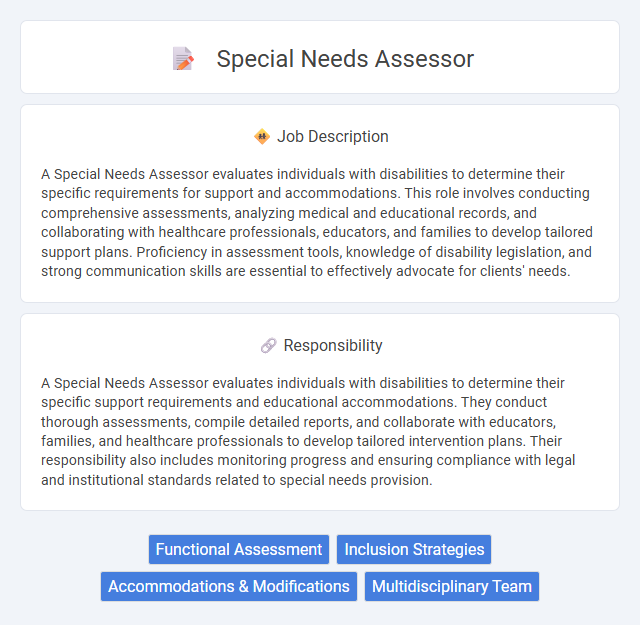
A Special Needs Assessor evaluates individuals with disabilities to determine their specific requirements for support and accommodations. This role involves conducting comprehensive assessments, analyzing medical and educational records, and collaborating with healthcare professionals, educators, and families to develop tailored support plans. Proficiency in assessment tools, knowledge of disability legislation, and strong communication skills are essential to effectively advocate for clients' needs.
Special needs assessors likely work best with individuals who demonstrate strong empathy, patience, and excellent communication skills, as the role involves evaluating and supporting people with various disabilities and learning challenges. Candidates who are comfortable handling sensitive information and possess a background in education, psychology, or social work probably find this job rewarding and suitable. Those who prefer structured environments with predictable tasks might be less suited due to the diverse and often unpredictable nature of clients' conditions and needs.
Qualification
Special needs assessors typically require a bachelor's degree in social work, psychology, education, or a related field, with many roles preferring candidates holding a master's degree or specialized certifications in special education or disability assessment. Professional experience working with individuals with disabilities, strong knowledge of legal and educational frameworks, and proficient assessment skills are essential qualifications. Effective communication and report-writing abilities, alongside ongoing professional development, enhance an assessor's capability to accurately evaluate and support individuals with special needs.
Responsibility
A Special Needs Assessor evaluates individuals with disabilities to determine their specific support requirements and educational accommodations. They conduct thorough assessments, compile detailed reports, and collaborate with educators, families, and healthcare professionals to develop tailored intervention plans. Their responsibility also includes monitoring progress and ensuring compliance with legal and institutional standards related to special needs provision.
Benefit
A Special Needs Assessor likely provides valuable support by identifying individuals' unique requirements, which may improve access to tailored educational and social services. This role probably enhances the effectiveness of assistance plans, increasing the chances of better outcomes for those with special needs. Employers might benefit from increased compliance with legal standards and improved satisfaction among service users.
Challenge
The role of a special needs assessor likely involves navigating complex cases that require comprehensive evaluation and sensitivity to diverse individual requirements. Challenges may arise in accurately identifying the specific needs of clients while balancing legal, educational, and social frameworks. The position probably demands strong analytical skills and the ability to communicate findings effectively to support tailored intervention plans.
Career Advancement
A Special Needs Assessor evaluates individuals with disabilities to determine appropriate support and accommodations, playing a critical role in education and healthcare settings. Career advancement in this field often involves gaining specialized certifications, pursuing advanced degrees in social work or counseling, and acquiring expertise in specific disabilities. Progression may lead to senior assessor roles, management positions, or consulting opportunities within government agencies and nonprofit organizations focused on disability services.
Key Terms
Functional Assessment
A Special Needs Assessor conducts comprehensive functional assessments to evaluate an individual's physical, cognitive, and emotional capabilities, identifying specific support requirements. These assessments involve standardized tools and observational techniques to determine the impact of disabilities on daily living activities and educational or occupational performance. Accurate functional assessment outcomes guide personalized intervention plans and resource allocation to enhance independence and quality of life.
Inclusion Strategies
A Special Needs Assessor evaluates individual requirements to develop effective inclusion strategies that support diverse learning environments. Their role involves collaborating with educators and families to implement tailored accommodations and interventions, ensuring equal access to education for students with disabilities. Expertise in legal frameworks and assistive technologies further enhances their ability to promote inclusive practices within schools and communities.
Accommodations & Modifications
Special needs assessors evaluate individual requirements to determine appropriate accommodations and modifications that support learning, communication, and daily living activities. They develop tailored intervention plans addressing physical, cognitive, or sensory impairments by collaborating with educators, therapists, and families. Expertise in legal frameworks like the ADA and IDEA ensures compliance while promoting inclusive environments through assistive technologies, adaptive strategies, and environmental adjustments.
Multidisciplinary Team
Special needs assessors play a crucial role within a multidisciplinary team, collaborating with educators, healthcare professionals, and social workers to evaluate individuals' unique requirements. Their assessments inform personalized education plans and support strategies that address cognitive, emotional, and physical challenges. Effective communication and shared expertise ensure comprehensive evaluations and tailored interventions that improve outcomes for students with special needs.
 kuljobs.com
kuljobs.com